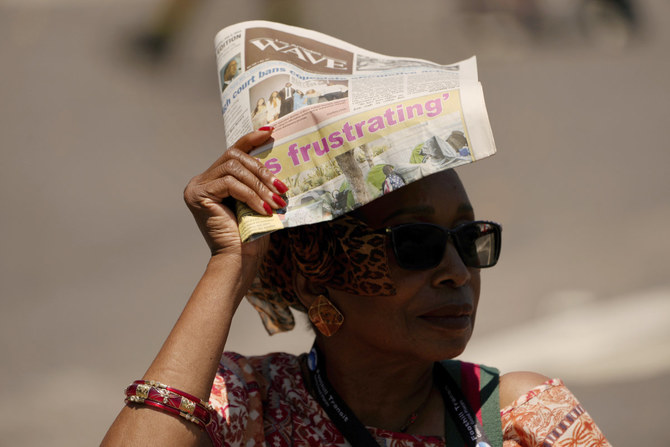MUMBAI/LAGOS/LONDON: Women will bear the brunt of extreme heat as more frequent heatwaves on a warming planet pose a growing threat to their work, earnings and lives, researchers have warned.
The impacts of rising heat are disproportionately dangerous and costly to women — be it at home or on the job — according to a report titled ‘The Scorching Divide’ by the Adrienne Arsht-Rockefeller Foundation Resilience Center (Arsht-Rock).
The US-based non-profit’s research, which analyzed India, Nigeria and the United States, said that extreme heat could kill 204,000 women annually across the three countries in hot years.
“Extreme heat is quietly but profoundly brutalising women worldwide,” said Kathy Baughman McLeod, director of Arsht-Rock. Heat creates a “double burden” for women, the report warned.
“Women are not only more susceptible to physically getting sick from heat, they’re also disproportionately expected to care for everyone else who’s sick from heat, whether that’s paid care or unpaid care,” McLeod told the Thomson Reuters Foundation.
Heatwaves are breaking records around the world and the continued release of planet-heating emissions — largely from the use of coal, oil and gas — will push global temperatures into uncharted territory in the coming years, scientists have said.
The debilitating heat will take its toll on women, forcing them to work longer hours — whether outdoors on a farm, for example, or doing unpaid domestic work like cooking and cleaning at home — for less money or no income at all, the report said.
“Women in poverty are being pushed further into poverty, and women climbing out of poverty are being pulled back in,” McLeod said.
LACK OF COOLING HITS WOMEN HARDEST
With the average number of heatwave days projected to at least double by 2050 in India, Nigeria and the United States, women from the poorest and marginalized communities will suffer the biggest blow to their productivity, the report found.
Much of these heat-related productivity losses — pegged at about $120 billion each year across the three countries — are in the context of unpaid household work and linked to lack of access to domestic cooling equipment, according to the research.
About 1.2 billion rural and urban poor globally are expected to be living without cooling solutions by 2030, with 323 million of them in India alone, according to Sustainable Energy for All (SEforALL), a UN-backed organization working on energy access.
These solutions range from domestic air-conditioning to cold chains for farm produce.
Women spend almost twice as much time than men working at home, taking care of children or older relatives and managing the house — and those who cannot afford air-conditioning experience a bigger hit to their productivity, the report found.
In nations such as Nigeria, where heat exacerbates symptoms of tropical diseases from malaria to yellow fever, mothers bear the “double burden” of looking after themselves and caring for sick family members, amounting to hours of unpaid work.
Doctors in Nigeria, who experience frequent power cuts, are calling for better-ventilated hospitals and say pregnant women should take breaks of at least three hours if working outdoors.
“Pregnant women are at greater risk of heat-related deaths as increasing temperature affects fetus growth and complicates the overall health of an expectant mother,” said Samuel Adebayo, a gynaecologist in Lagos.
Nigeria accounts for 20 percent of global maternal deaths — 58,000 women per year — said the Arsht-Rock report, citing World Health Organization (WHO) data, and heat adds yet another complication.
In Britain, where women from Black communities are nearly four times more likely than white women to die in childbirth, climate change will only exacerbate the challenges they face, according to Selvaseelan Selvarajah, a doctor in east London.
While the rich can afford air-conditioning units and electricity costs, the poor cannot, Selvarajah said.
“In poor housing, even if the council gave you air-conditioning, you’re paying hundreds of pounds a month for your electricity — you’re not going to want to turn it on,” he said.
INVISIBLE LABOUR PUTS BIGGER BURDEN ON WOMEN
Farm worker Savitri Devi, 40, soldiered through the harsh summer in the northern Indian state of Uttar Pradesh this year, working in fields at temperatures as high as 44 degrees Celsius (111.2 degrees Fahrenheit) even as scores of people died during the heatwave in the state in June.
Women in India lose nearly a fifth of their paid working hours to heat, and extreme heat is pushing female wages below the poverty line in sectors including agriculture, which accounts for 70 percent of total female employment, the report found.
“I obviously suffered working in the sun. I fell ill, and my wages were cut for every hour lost due to the heat. But what do I do? I have to work for money,” said Devi, who earns 250 rupees ($3.05) for eight hours of work per day.
Labour experts said rising heat has compounded the problem — particularly for the rural poor. As droughts dent crop harvests and fuel male migration from villages in search of alternative work, women are left behind to take care of farms and families.
Benoy Peter, executive director of the Center for Migration and Inclusive Development, a Kerala-based non-profit, said most agricultural work in rural India consists of invisible labor by women — who assume a bigger burden when men migrate to cities.
“So women do the farm work, take care of older people and children. But if they fall ill, there is no one to take them to a health facility,” he said.
McLeod of Arsht-Rock said people were starting to understand the effects of heat — from a financial and health perspective — and stressed the need to take urgent action on the issue.
“This crisis, given where our emissions are ... it’s only getting worse,” she said. “No one has to die from heat. All of these deaths and illness are preventable. We just hope that people pay attention.”














